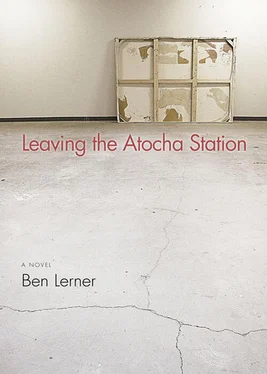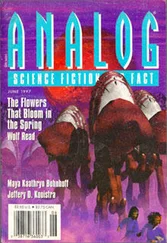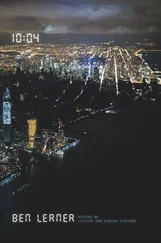After I don’t know how long, Teresa emerged from the crowd and found me. She was with a man I didn’t recognize. Even from far away, I could tell that he was handsome. When they reached me she spoke to me in English.
“Where did you go?” she said. And when I didn’t respond, she said in Spanish, “This is Carlos.”
I shook Carlos’s hand as jealousy spread through my body. He was a full six inches taller than I was.
We stood together and faced the protest. The crowd had expanded so that now, while we were still apart from it, we were close enough that our presence expressed fellowship. Without warning and with improbable volume, Carlos started a chant about Rajoy. He was bellowing, and yet he seemed completely calm. At first he was the only one chanting his chant and I hoped nobody would pick it up, that he would have to abandon it, embarrassed. But then the other people who were near the crowd but not part of it joined Carlos in chanting. And once the people who were near the crowd were linked by the chant, they moved and we moved with them into the crowd and were absorbed. Then Carlos’s chant spread from our part of the crowd forward and grew deafening. Carlos’s voice was no longer distinct and I looked at his handsome face and hated it.
Again I retreated and Teresa saw me go and just waved good-bye and I felt annihilated. I tried to smile at her in a manner that doubted her politics, doubted her place in the crowd, but could not. I wound my way through various small streets until I found myself near Sol. From there I walked to my apartment and once in my apartment read about the unfolding events of which I’d failed to form a part. The elections were tomorrow. I tried to think about whether public outrage would cost the PP the elections, about blood on the platform and the makeshift morgue in the convention center near Atocha, but instead I imagined making love with Teresa as if I were remembering it. Then I imagined her fucking Carlos and felt sure that when I left they had gone immediately back to her apartment. I tried to think about Isabel, could not, but was reminded of the necklace, which I took out of its case. It felt like I’d been carrying it for years. I put it back in its case and left the apartment for the jewelers to see if I could return it. By the time I reached the jewelers I doubted I would have the courage to face the woman who sold it to me; I was relieved to find the store was closed.
I walked to the Reina Sofía, bought a ticket, and wandered through the giant Calder exhibit. The museum was almost empty. The large white rooms reminded me of Teresa’s apartment and I imagined sleeping with both Carlos and Teresa at the same time and being humiliated by his beauty and size. I pictured giving Teresa the necklace, how she would accept it graciously but without surprise or emotion and I was furious at her. There was a very young museum guard, a teenager, sending a text beneath a giant mobile. I approached her and said that I had bought a necklace for my girlfriend but that we had broken up and I was leaving the country the next day; I didn’t want the necklace, would she like it. Without giving her time to answer, I handed her the case and walked away.
From the museum I went to the café where I took my lunch almost daily and ordered one of the hard sandwiches and a watery beer. When I had finished my meal I was surprised that it was dusk, I must have slept very late, and I walked into El Retiro to buy more hash. I scoured the park but could not find a dealer anywhere. It occurred to me that they’d probably been rounded up by the police, questioned, and perhaps deported since, as I had read, there was some speculation that the bombers had come from North Africa. I sat on a bench and watched the wind in the old-world trees and said to myself that I would not go to Teresa’s apartment or the gallery. I swore that I would wait for her to come to me and if she never came, so be it. But then I said to myself that History was being made and that I needed to be with Spaniards to experience it; I should at least try to find Arturo. I knew I was only elaborating an excuse to see Teresa. I tried to justify my pettiness by meditating on the relation of the personal to the historical but my meditations did not go far; I stood, absently checked my pockets for tranquilizers, and began to walk quickly through the thickening dusk.
I was lost for a little while but eventually found her building, rang the bell, and was immediately buzzed in. As the elevator slowly ascended — it worked without the key — I began to hear music and voices and laughter; I was still attempting to compose my face when the doors opened. There were a lot of people, Teresa and Rafa the only two I knew, smoking and drinking and talking animatedly about the protests and elections. Several people were on phones. I looked around for Carlos but did not see him and a wave of relief broke over me. Teresa was on the red sofa admiring another woman’s earrings; she did not stand to greet me. I walked to Rafa, who was looking through Teresa’s music, and asked him where Arturo was as if it were important that I find him. Without listening to his response I walked out onto the balcony and lit a cigarette and there was Carlos, smoking with two other men. Carlos smiled a smile I experienced as triumphant, postcoital, and said hello. He did not introduce me to his friends, who struck me as stylish and hostile; they were heavily and expensively tattooed. I grinned at the friends in a way that suggested I would slit their throats if given the chance and echoed Carlos’s greeting. I wasn’t sure what to do; I could not return to the apartment without it seeming like a retreat and I was too full of jealousy to attempt casual speech. Finally Carlos said something to me about how this must be an interesting time to be an American in Spain. I said it was, ignoring the derision with which he’d pronounced “American.” What did I think, he said. About what, I asked. About everything, he said. I looked off in the distance as though I was making an effort to formulate my complex reaction so simply even an idiot like him might understand. Then, as if concluding this was an impossible task, I said I didn’t know.
“I enjoyed your poetry reading a few months ago,” said one of his friends. He sounded gentle and sincere and I was bewildered. I wondered if Carlos in fact was being completely friendly, if I was only projecting my jealousy. I felt a little crazy and remembered puking in the bathroom at Zalacaín.
“Thanks,” I said.
“Are you going to write a poem about the bombings?” Carlos asked, the mockery unmistakable. I wanted to throw him from the balcony. I finished my cigarette before saying no.
I walked back into the apartment, saw a space beside Teresa on the couch, and sat down. She started playing with my hair and I said to her in English that Carlos might get jealous; she ignored me. I wanted to kiss her but didn’t. I took a book from a stack nearby and feigned interest, thrilled she was flirting with me in plain sight. After a while Carlos and his friends returned and Carlos said something to a few of the other people milling around and then said to Teresa that they were going to rejoin the protest, that he would text her later. O.K., she said, smiling at him the same way she had smiled at me. They kissed each other on both cheeks and while he was near her ear he whispered something and she laughed. “Later,” he said to me, and I said good-bye as if I couldn’t quite remember who he was.
Soon the other guests, including Rafa, left the apartment, presumably for the protest. I continued to look at the book, a novel by Cela. Teresa went to her desk and when she came back she had a thin joint, which she lit and passed to me. It was weed, not hash. When we finished she went to her closet and began to change. I rose and walked to her and held her from behind and kissed her on the neck. She turned to me and we kissed for a while but for reasons mysterious to me, that was that. I sat back down and she finished changing and then sat beside me and resumed doing the thing with my hair and asked if I wanted to find the protests. I said I was too high and she squinted and said she felt she needed to go. I didn’t say anything. She said I could stay there and read or whatever until she returned. I thought of Carlos.
Читать дальше












